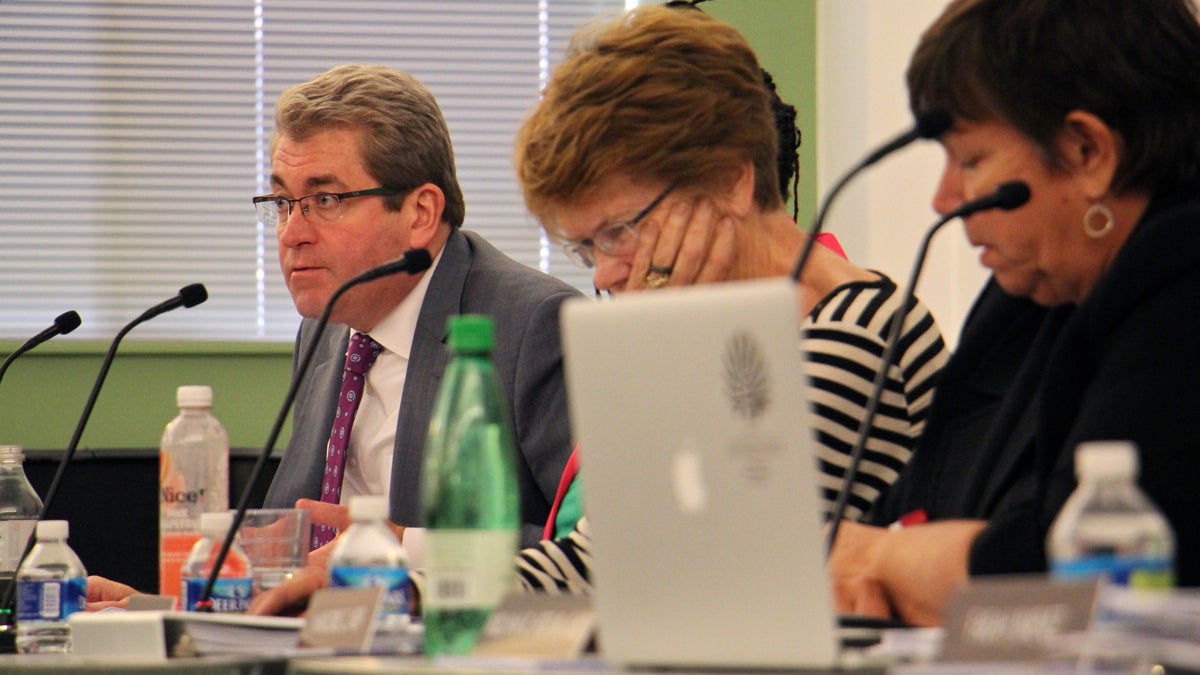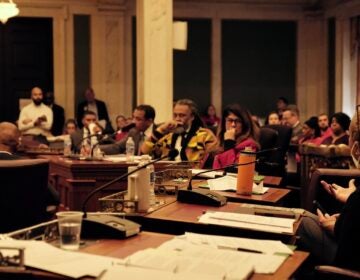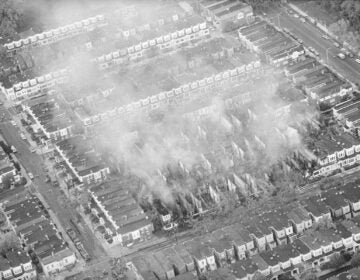Philly SRC stalls again on four contested charter schools

School Reform Commission member Bill Green asks for more information about a charter school renewal. The board postponed action on four schools that had been recommended for non-renewal. (Emma Lee/WHYY)
Philadelphia’s School Reform Commission has again delayed action on four turnaround charters schools — schools the district has recommended for non-renewal.
This is the second time Philadelphia’s top education officials have tabled decisions on the quartet of schools, which are all part of the city’s Renaissance Schools initiative.
Olney Charter High School and John B. Stetson Charter School of the ASPIRA network, and Audenried Promise Neighborhood Partnership Charter School and Vare Promise Neighborhood Partnership Charter School of the Universal Network were recommended for non-renewal by the district’s charter school office in May. The district cited poor academic performance, as well as financial and organizational instability in its recommendation.
The four schools have been in limbo since then, with a majority of the SRC’s five members unable to reach consensus on their future. It appeared initially there might be some definitive action on the schools during Thursday’s SRC meeting. All four were listed on the commission’s resolution agenda.
Instead, after a brief public discussion, SRC Chairwoman Marjorie Neff withdrew all four resolutions.
“It was clear that what we were going to do, as we did in May with Universal, is have a split vote,” said Neff. “And a split vote means no action is taken. So the hope is that we’ll keep working and come to a decision.”
Barring an unforeseen change, next month’s SRC meeting will be the third time a non-renewal vote is presented to the SRC for the two ASPIRA schools. Commissioner Bill Green hinted it may be the last. “If the governance issues which remain open with ASPIRA are not resolved,” he said, “if the cross-collateralization and other lien issues with respect to their financing are not resolved by the October meeting, to my satisfaction, I will certainly be seconding a motion to non-renew and voting to non-renew ASPIRA.”
In recommending non-renewal for the ASPIRA schools, the district charter office cited a slew of transgressions. Many related to financial and organizational mismanagement. They included accusations that ASPIRA schools took money earmarked for one charter and used it for another. Under Pennsylvania law, each charter school is required to be its own fiscal entity.
ASPIRA also made headlines earlier this month when an investigation by Fox29 revealed the group’s insurance compay paid $350,000 to a former employee who had accused CEO Alfredo Calderon of sexual harassment. The Fox29 report also suggested Calderon had a pattern of improper behavior toward female co-workers.
That report did not come up in Thursday’s meeting.
The commissioners did, however, reference former City Solicitor Ken Trujillo, who has been attempting to resolve some of the organizational issues that have dogged the ASPIRA Schools. Trujillo announced he’d be assisting ASPIRA in late May, the last time the non-renewal proposals came before the SRC.
At that time, Green said the SRC should give Trujillo time to work with ASPIRA. On Thursday, he suggested the window was closing.
“I’m at the point where I’m out of patience, and I want to see action on this one way or the other so we can take it out of limbo,” Green said.
It’s less clear what the SRC intends to do with the two schools run by Universal. The commissioners didn’t discuss Vare or Audenried during the public portion of Thursday’s meeting.
Renaissance schools are district schools converted into charter schools, with the expectation of a quick academic turnaround. The district charter office cited sluggish academic growth in its recommendations for non-renewal at the two Universal schools.
Yet when the renewal resolutions came up for vote in May, the commissioners deadlocked. Green said he’d favor a modified, three-year renewal for Vare and Audenried with strict conditions. The SRC approved a similar arrangement at Guion Bluford, another Renaissance charter operated by Universal.
Search is on for undervalued properties
On Thursday, the SRC also approved contracts with two firms hired to help the district find properties that have been undervalued by the city and appeal those valuations.
The district collects tax revenue based on the assessed value of city properties, and the initiative is designed to find properties that have been underassessed by $1 million or more. District officials suspect there are scores of such properties, and see the contracts as potential revenue generators.
The district selected Keystone Realty Advisors LLC out of Northern California to scour the city for undervalued lots. It also hired Fellerman & Ciarimboli Law, P.C., a Pennsylvania law firm specializing in personal injury suits, to oversee the formal appeals process.
The district will pay Keystone Realty Advisors and Fellerman & Ciarimboli on a per-property basis, meaning money will only change hands if an appeal is successful. As prescribed by law, the district receives 55 percent of property tax revenues. The other 45 percent goes to the city.
The city will receive every cent of extra revenue generated by the district’s new appeals initiative. The district, however, will split its share with the firms it hired Thursday.
In the first two years following a successful appeal, the district will collect 60 percent of its share of the new tax dollars. The other 40 percent will be split evenly between the real estate appraisal firm and the law firm. After the two years pass, the district will keep all additional revenue in perpetuity.
For example, if a court determines that a property owner must pay $1 million more in property taxes than previously paid, the city would collect 45 percent, or $450,000. The other $550,000 would go to the district, which would then pay $222,000 to Keystone Realty Advisors and Fellerman & Ciarimboli. The district’s total take would be $328,000. That arrangement will remain in place for the first two tax cycles after the tax rate adjustment. From year three onward, the district will keep all $550,000 in added money.
The contract approved Thursday by the SRC permits the district to pay $500,000 to each firm. Upon crossing that threshold, the district would have to present a new contract to the SRC for the initiative to move forward.
But it means the district would be challenging the city’s own tax valuations. District CFO Uri Monson told the SRC Thursday he’d discussed the strategy with the city’s Office of Property Assessment and that the city supported the school district’s efforts. He also reiterated earlier statements that he did not know how much extra tax money the firms would unearth.
Last fiscal year, the district received about $700 million from local property taxes.
Also at Thursday’s meeting the SRC established a new school to be housed at the old Vaux High School in the Sharswood section of North Philadelphia. The district decided to close Vaux in 2013 after a failed turnaround attempt.
The replacement school will be called Vaux High School: A Big Picture School (Vaux BPS). It will enroll 500 students in grades nine through 12 and open in time for the 2017-18 school year. The reanimated version of Vaux will be a contract school, meaning it will be run by a nonprofit group — in this case, the Big Picture Learning network — but will remain a district school. Several schools in the district’s Innovative Schools network operate under the same model.
The rebirth of Vaux coincides with an ambitious development project in Sharswood spearheaded by the Philadelphia Housing Authority.
WHYY is your source for fact-based, in-depth journalism and information. As a nonprofit organization, we rely on financial support from readers like you. Please give today.






